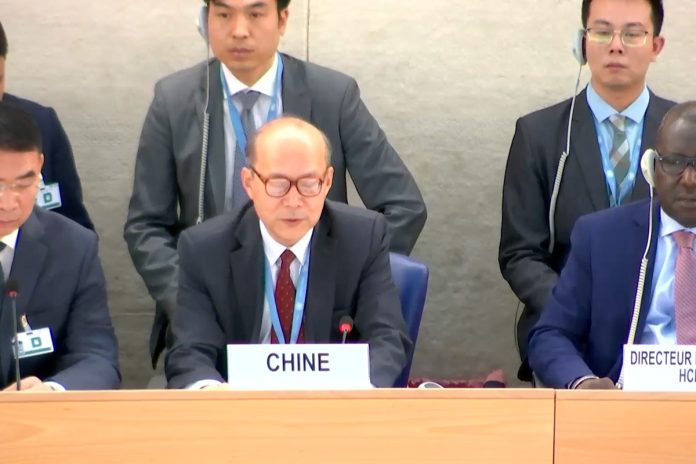Before States gathered at the UN Human Rights Council, China doubled down on its refusal to follow up its high rhetoric on human rights with concrete actions.
On 4 July, at a UN dialogue in Geneva to discuss the adoption of the official report following its UPR review last January, Chinese diplomats reiterated their intention to ignore concrete recommendations to cease some of the most blatant human rights violations in their country.
The UPR – a Human Rights Council review in which States examine each other’s rights every five years and make recommendations for improvements – relies upon a government’s good faith engagement. Beijing’s dismissal of recommendations echoing UN findings, seeking access to the whole territory for UN experts, and its acts of intimidation against civil society trying to join the review, removed any doubt on its lack of goodwill.
In a joint statement on behalf of 29 NGOs delivered at the Human Rights Council after China’s remarks, ISHR urged China to ‘genuinely engage with the UN to enact meaningful reforms’ in line with the recommendations from the UN’s Xinjiang report, UN Treaty Bodies and UN Special Rapporteurs.
Chinese envoys pushed back against criticism from the United States and the United Kingdom, who called on Beijing to take urgent measures to end the persecution of religious and ethnic minorities in the country’s Uyghur region, and to end reprisals against activists and lawyers seeking to enforce human rights covenants.
China received unequivocal support from States such as Russia and Venezuela, who asserted Beijing met its human rights obligations and who discarded documented abuses as ideologically motivated. Despite the widely known presence of ethnic Uzbeks among the more than one million Turkic Muslims that have been forced into labour camps in the Xinjiang Uyghur region, the representative for Uzbekistan pushed for the adoption of China’s UPR report ‘by consensus’.
Many of the UPR recommendations that have gone ignored, civil society speakers noted, came in response to long-standing concerns over serious allegations of abuse that have been extensively documented by dozens of impartial UN experts and committees. Many of them had already been raised during China’s last UPR in 2018 – eliciting only denials and no concrete response or course correction from Chinese authorities.
‘Beijing’s facade as a constructive actor at the UN is shattered by its acts of reprisals against human rights defenders throughout this UPR cycle, and by attempts to block NGO access to this very room,’ the joint statement stressed. ‘How can this record be reconciled with any attempt to become a constructive, reliable multilateral actor?’, it asked.
The NGOs also reminded the Human Rights Council that Beijing has worked to undermine UN mechanisms and punish citizens who would seek to engage with them, citing the case of woman human rights defender Cao Shunli, who died in 2014 after months of custody following her arrest for attempting to engage in the country’s second UPR review, in 2013.
In its official response to UPR recommendations made at its 2024 review, published ahead of the meeting, China rejected some 30% of them – up from an 18% rejection rate at the country’s last review in 2018.
Worryingly, Beijing discarded calls from countries from both the West and the Global South to implement recent findings from UN committees on women’s rights, socio-economic rights, and other issues, framing some of them as being ‘based on false information’ and cynically asserting that it already ‘protects the lawful rights of all citizens as equals’.
Unsurprisingly, rejected recommendations were centred on the situation of Uyghurs and Tibetans, the rule of law in Hong Kong, and the State’s repression against human rights defenders, lawyers and journalists. LGBTIQ+ advocates particularly regretted the rejection of all but one recommendation related to their rights. In 2018, Beijing had accepted all LGBTIQ+ related recommendations.
The United Kingdom called on Chinese authorities to end the persecution of minorities in Xinjiang and Tibet and of all individuals persecuted under Hong Kong’s National Security Law, including Jimmy Lai. United States representatives called for the release of all persons facing arbitrary detention, citing the findings of the UN Working Group on Arbitrary Detention, also urging Beijing to end its practice of pursuing dissent even outside its own borders and engaging in transnational repression.
In stark contrast to the diplomatic and civil society voices urging Beijing to take action to reverse policies leading to blatant human rights violations, an unsettling number of State representatives relayed government talking points, congratulating China on supposed successes, mainly related to poverty reduction and economic growth.
This meeting also comes days after ISHR, Human Rights Watch, Amnesty International and the World Uyghur Congress publicly urged UN High Commissioner for Human Rights Volker Türk to follow up on and keep pressure on China to answer for the findings of his office’s 2022 reporting on the situation in Xinjiang.









































